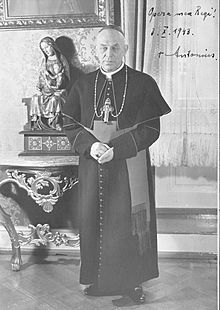Antonius Hilfrich
Antonius Hilfrich (born November 3, 1873 in Lindenholzhausen ; † February 5, 1947 in Limburg an der Lahn ) was the Roman Catholic Bishop of Limburg from 1930 until his death .
Life
Hilfrich was the fifth of twelve children in a farming family. His older brother Joseph Anton was the pastor of the Catholic parish in Frankfurt am Main , one of his sisters entered the order of the poor servants of Jesus Christ . His great-nephew Georg Rompel was later the papal house prelate and honorary canon of the Limburg diocese .
Antonius Hilfrich studied in Rome, where Louis Billot was his most influential teacher. There he was ordained a priest in 1898 . Then he was chaplain in Weilburg and Frankfurt, from 1902 to 1911 Regens des Konvikt in Hadamar and then pastor in Wiesbaden, from 1927 as city pastor. On March 31, 1930, at the request of the terminally ill Limburg bishop Augustinus Kilian, he was appointed coadjutor of the diocese and titular bishop of Sebastopolis in Armenia . After Kilian's death on October 30th of the same year, Hilfrich was taken over by Pope Pius XI. appointed his successor. The episcopal ordination in St. Boniface in Wiesbaden gave him Archbishop Karl Fritz . Hilfrich died in the office of bishop.
Act
Hilfrich was an opponent of the Nazi regime and made this publicly clear, but his statements were not as well known as the Cardinal Graf von Galens . In 1935, in front of thousands of young people in Frankfurt Cathedral , he spoke out against the disruption of church services through political events and increasing disruptions in religious education, and warned of serious interference with church life. After mentally handicapped foster children were evacuated from the St. Valentinushaus in Kiedrich and the St. Vinzenzstift in Aulhausen in 1937, he insisted on the ecclesiastical character of the Vinzenzstift, whereupon the National Socialist People's Welfare (NSV) relocated the children, the Dernbacher sisters drove out and the home into one NSV convalescent home converted. On August 13, 1941, Hilfrich protested in writing to the Reich Ministry of Justice against the killing facility in Hadamar - eight kilometers from Limburg - in which disabled and sick people were murdered in Operation T4 :
"It is incomprehensible to the population that planned actions are carried out which are punishable by death according to § 211 StGB !"
Hilfrich asked the Reich Minister "to want to prevent further violations of the fifth commandment." After corresponding resistance from the Protestant Church, on August 24, 1941, Hitler's instructions, the mass killings were suspended, from mid-1942 onwards in the Brandt campaign with "starvation cures", Drug overdoses or air injections into the veins resumed. Hilfrich could achieve little against the arrest and sanctioning of some of his priests.
Hilfrich struck anti-Judaist tones when he wrote in a pastoral letter in February 1939, “that the Christian religion did not grow out of the nature of this people (= the Jews), that is, it was not influenced by the racial characteristics of this people, but against them The people had to prevail. Christ is not a fruit of this people, but a gift from heaven in his incarnation . ... the mortal enmity of the leading circles against the Savior and the obstinacy of post-Christian Judaism show that the Christian religion is not a spirit of Judaism. "
In 1940 he announced: "I do not need to admonish you, my dear diocesans, that in difficult times you feel that you are united to the people and that you are brave and loyal as members of our people out in the field and at home in the labor service."
Individual evidence
- ↑ Hilfrich's letter printed by: Ernst Klee (Ed.): Documents on »Euthanasia«. 5th edition, Fischer Taschenbuch, Frankfurt am Main 2001, ISBN 3-596-24327-0 , p. 231f / quotation p. 232.
literature
- Antonius Hilfrich , in: Internationales Biographisches Archiv 40/1947 of September 22, 1947, in the Munzinger Archive ( beginning of article freely available)
- Wilhelm Pappert: Dr. Antonius Hilfrich. Bishop of Limburg. In: Archive for Middle Rhine Church History . Vol. 1 (1949), pp. 351-356 ( digitized version ).
Web links
- Entry on Antonius Hilfrich on catholic-hierarchy.org
- Short biography of the Diocese of Limburg about Antonius Hilfrich
| predecessor | Office | successor |
|---|---|---|
| Augustine Kilian |
Bishop of Limburg 1930–1947 |
Ferdinand Dirichs |
| personal data | |
|---|---|
| SURNAME | Helfrich, Antonius |
| BRIEF DESCRIPTION | German clergyman, Bishop of Limburg |
| DATE OF BIRTH | November 3, 1873 |
| PLACE OF BIRTH | Lindenholzhausen |
| DATE OF DEATH | February 5, 1947 |
| Place of death | Limburg on the Lahn |
